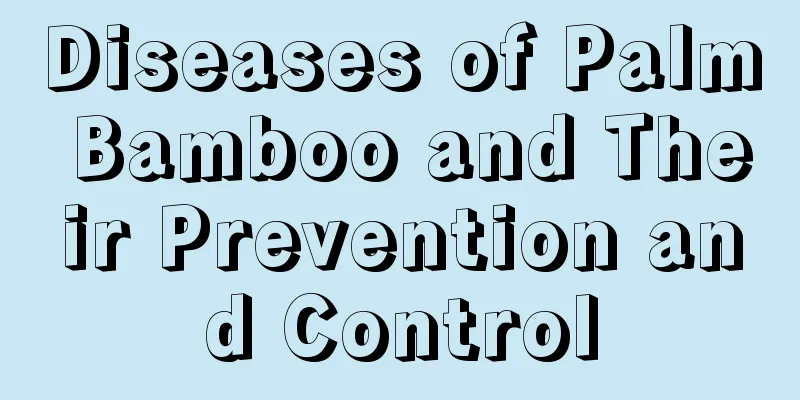Diseases of Palm Bamboo and Their Prevention and Control

Anthracnose of bamboo palmsymptomAnthracnose is one of the important diseases of palm bamboo, which mainly harms the leaves of palm bamboo. When the disease occurs, semicircular or irregular spots will appear on the leaf tips or edges of the bamboo palm, appearing yellowish brown or grayish brown. When the air is too humid, scarlet needle-sized liquid spots will appear on the leaves. Prevention and treatment methodsCombined with winter and spring pruning, clean up the fallen leaves and weeds on the surface of the potting soil. In the early stage of the disease, you can regularly spray 600-800 times diluted Guoguang Yintai wettable powder, Guoguang carbendazim, and thiophanate-methyl for prevention. When the disease is mild, use 400-600 times diluted Guoguang Yingna wettable powder or 500-600 times diluted Guoguang Bixin emulsifiable concentrate for foliar spraying for prevention and control. Use it 2-3 times in a row with an interval of 7-10 days. Diseases of bamboo palm: leaf spot diseasesymptomWhen leaf spot disease occurs in bamboo palm, small yellow-brown spots will initially appear on the leaves, gradually expanding into striped patterns and merging into irregular necrotic spots. The first parts to be affected are the leaf tips and edges. In severe cases, the leaves will shrink and the plant will die. Prevention and treatment methodsStrengthen management, do not apply nitrogen fertilizer alone, and increase the application of potassium fertilizer to improve the plant's disease resistance. In the early stage of the disease, you can spray 300-500 times diluted 50% carbendazim wettable powder once a week for 3 times in a row. Palm bamboo disease - bud rotsymptomBud rot mainly harms young buds and tender leaves. When the disease begins to occur, the unexpanded leaves wither first, turn brown, and then droop. The pathogen spreads from between the young leaves to other parts of the plant, causing the plant to stop growing and slowly rot, emitting a foul odor. The disease mainly occurs in the rainy season, when the temperature is 20℃ to 25℃ and the relative humidity is above 90%. The disease is prone to occur when moisture stays for a long time. Prevention and treatment methodsNormally, ventilation and light transmission should be strengthened to prevent moisture from remaining on the leaves for a long time. In the early stage of the disease, only a small number of diseased leaves are infected. The diseased leaves and stems should be removed in time, sprayed with carbendazim for sterilization, and ventilation should be carried out in time. When the disease is serious, spray 500 times diluted 80% mancozeb wettable powder, or 1:1:100 Bordeaux mixture, and spray the leaves in turn once every 10 days for 3 to 4 times. |
<<: Common diseases and pests of mirror grass and their prevention and control methods
>>: Campanula pests and diseases and control methods
Recommend
Apple Growing Conditions and Characteristics
Apple Growing Conditions Apples are generally mor...
How much is the average yield of mint per mu? Planting prospects and per mu yield benefit analysis
Mint yield per mu The per-acre yield of mint is r...
How to propagate dianthus and what to pay attention to
How to reproduce dianthus There are three common ...
How many times can edamame be planted in a year? What is the planting time and how many days is the growing period?
How many seasons can edamame be planted in a year...
How to root succulent plants
Root cutting process Tools: Scissors, small flowe...
Why does the tiger thorn plum drop its leaves? What should I do if the leaves drop?
1. Unsuitable soil Euphorbia milii grows best in ...
Cultivation methods and precautions of ground melon
1. Growth habits First of all, it has strong drou...
What to do if the leaves of the money tree turn yellow
1. Reduce watering Reason: Watering is irregular ...
Cultivation methods and precautions of blue stone lotus
Blue stone lotus needs more light to grow The lea...
Method for accelerating germination of woody flower seeds
Seed soaking method Some seeds need to be soaked ...
How to wash bayberry
1. Cleaning method 1. Clean with salt water: If y...
Why are the leaves of Kalanchoe turning yellow?
1. Metabolism Reason: The yellowing of the leaves...
Can peach blossoms be soaked in water and drunk?
1. Can I soak it? Many friends must know its orna...
The difference between purple root orchid and amaryllis
1. Differences between bulbs The color of the pur...
What is the best month to plant okra?
When to plant okra Okra is generally planted in s...









